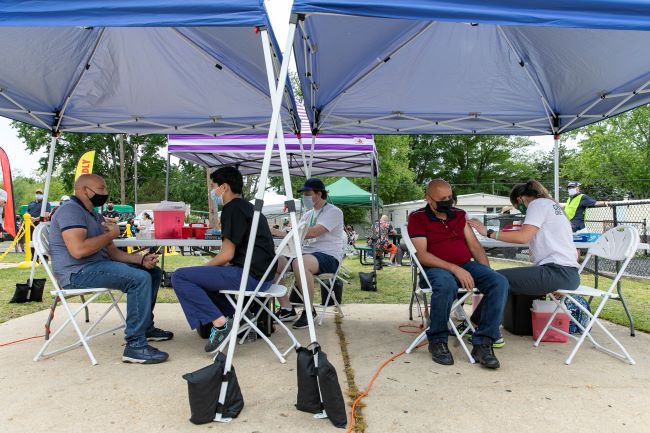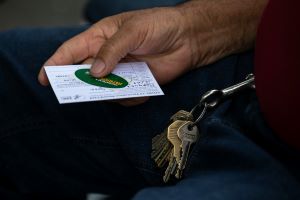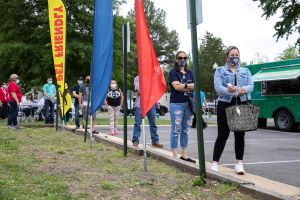They began arriving early. The line to the George Mason University Mobile Vaccination Clinic was soon snaking around the corner with those eagerly anticipating their second Pfizer COVID-19 vaccination shots.
It wasn’t long before residents of the Audubon Estates mobile home community in Fairfax County had acquired what they desperately sought and left with the palpable relief that comes with soon being fully inoculated against a virus that has killed millions of people around the globe and sickened far more.
“This was a big step for the community,” said resident Carla Claure.
And that was exactly the point.
Working in conjunction with the Fairfax County Health Department and numerous community leaders in the fight against COVID-19, Mason has begun delivering vaccines to low-income areas that have been hit hardest by the virus and whose residents typically have far less access to health care.
In response to the global pandemic, Mason began vaccinations clinics on Mason’s Fairfax Campus in late January and is now a regional leader with more than 75,000 shots from all Mason’s vaccination clinics distributed since then, including nearly 2,000 to children ages 12-15 last week alone.
The mobile vaccination clinics began running twice per week in April, but Mason officials hope to hold as many as four per week as of June.
Doing so comes with some challenges, such as overcoming language barriers, vaccine hesitancy and a fear of government among close-knit communities such as Audubon Estates, where Hispanics comprise an estimated 90% of the community’s 700 trailer homes.
But university officials say they’ve been pleased by the overwhelming response they’ve seen since the program’s inception.
“This is where the difference is going to be made,” said Julie Zobel, Mason’s associate vice president for Safety, Emergency, and Enterprise Risk Management. “These are people who—for one reason or another—would not have come to EagleBank Arena. So it’s important that we get to them and get these vaccines into the communities.”
The mobile vaccination team includes volunteer Mason staff, as well as numerous local liaisons who leverage their established relationships within their communities to help provide translators and the critical trust needed for such an undertaking. There are generally five to 10 translators at each mobile clinic, Zobel said.
The actual shots come through local health departments and from the state. Local community leaders have been very effective in putting out word about the vaccination clinics and vouching for them to those perhaps wary of dealing with strangers.
“It’s all about community involvement,” said Allyson Pearce, a spokesperson for the Fairfax County Health Department.
The project received a critical boost at the outset with the addition of the University Life truck that serves as a critical storage and staging area for the actual vaccination efforts. Rose Pascarell, Mason’s vice president for University Life, said that she was thrilled to help.
“It seemed like a great way to be a positive partner in the community,” she said, “and to use what we have available to help get the vaccines into the community. Mason’s mission has always been about access, and this just further solidifies that commitment to access.”
The results of their collective efforts have been encouraging so far, as the mobile vaccination clinics have averaged roughly 350 shots per event. Sunday’s latest at Audubon Estates was primarily for those seeking their second Pfizer shots after receiving their initial ones three weeks ago, although some seeking their initial shots were also accommodated. Those who received their first shots on Sunday were helped in scheduling their second doses in three weeks.
Mason officials say they hope to continue the clinics through the fall.
“I’m just happy to be here because this is also our community,” said Gina Reistrup, a Mason emergency management specialist who was also serving as a translator. “This has given me hope again. The winter was super hard, but this has given me hope again.”



